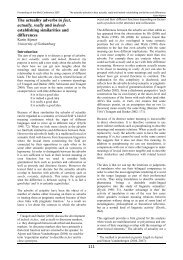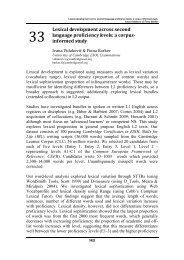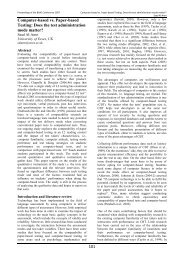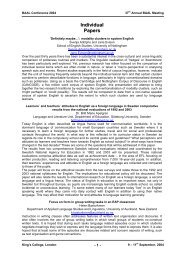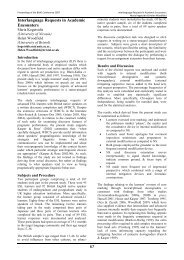Proceedings of the - British Association for Applied Linguistics
Proceedings of the - British Association for Applied Linguistics
Proceedings of the - British Association for Applied Linguistics
Create successful ePaper yourself
Turn your PDF publications into a flip-book with our unique Google optimized e-Paper software.
17<br />
Third Language Acquisition: L3 pr<strong>of</strong>iciency as a factor in Cross Linguistic Influence<br />
Ursula Langegger-Noakes<br />
Third Language Acquisition: L3<br />
pr<strong>of</strong>iciency as a factor in Cross Linguistic<br />
Influence<br />
Ursula Langegger-Noakes<br />
Bangor University<br />
This paper examines cross-linguistic influence (CLI) in oral and written L3<br />
productions <strong>of</strong> <strong>British</strong> university students. In common with o<strong>the</strong>r students<br />
<strong>of</strong> German in Great Britain, <strong>the</strong> majority <strong>of</strong> students at <strong>the</strong> School <strong>of</strong><br />
Modern Languages in Bangor, studying German, have English as L1,<br />
French as <strong>the</strong>ir L2 and German as <strong>the</strong>ir L3.<br />
The purpose <strong>of</strong> this paper is to report on findings <strong>of</strong> a study carried out with<br />
first and third year students <strong>of</strong> German at Bangor University. The written<br />
and oral work collected <strong>for</strong> <strong>the</strong> purpose <strong>of</strong> this study is, as one might call it,<br />
“au<strong>the</strong>ntic academic data” and consists <strong>of</strong> essays, short texts, presentations<br />
and interviews. The aim <strong>of</strong> <strong>the</strong> study is to investigate if <strong>the</strong> L3 pr<strong>of</strong>iciency<br />
level is a key variable in CLI, <strong>the</strong>re<strong>for</strong>e beginners’ and intermediate<br />
students’ productions were analysed.<br />
Error Analysis in some <strong>for</strong>m has been used as a tool by a number <strong>of</strong><br />
researchers in <strong>the</strong> field <strong>of</strong> Third Language Acquisition who investigate<br />
Cross Linguistic Influence or transfer. In SLA researchers employ<br />
frameworks to describe learners’ errors such as James’ (1998). In TLA <strong>the</strong><br />
majority <strong>of</strong> studies focus on <strong>the</strong> area <strong>of</strong> lexis (e.g. De Angelis & Selinker,<br />
2001; Cenoz, 2001; Ringbom, 2001, 2006; Tremblay, 2006) and<br />
researchers ei<strong>the</strong>r simply list <strong>the</strong> types <strong>of</strong> lexical deviation encountered,<br />
based on a descriptive grammar <strong>of</strong> <strong>the</strong> target language, or <strong>the</strong>y use<br />
classifications such as Ringbom’s (2001), <strong>for</strong> analysing lexical transfer,<br />
such as language switches, coinage, deceptive cognates, semantic<br />
extensions and calques or Hufeisen’s (1998), whose framework allows<br />
categorizing deviations on all linguistic levels, from <strong>the</strong> grapheme and<br />
morpheme level to <strong>the</strong> text level, and <strong>of</strong> three different types, namely<br />
syntactic, semantic and pragmatic. For this study Hufeisen’s framework<br />
was amended and Ringbom’s classification integrated, which resulted in<br />
<strong>the</strong> following framework below (table 17.1).<br />
Transfers <strong>of</strong> an L1 or L2 word <strong>for</strong>m, or parts <strong>of</strong> it, to <strong>the</strong> L3 are included in<br />
categories 1 to 7, transfer <strong>of</strong> meaning, e.g. semantic extensions, calques and<br />
87



